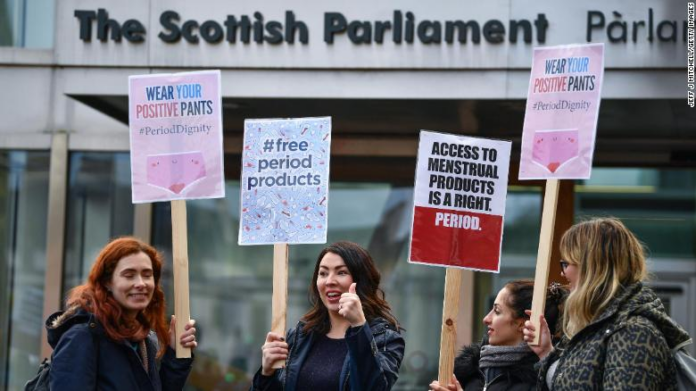By Amanda Ojeda
Every year, each woman spends about $150-$300 on menstrual products. Though this may not seem that bad, $150 is very important to those who need to buy a textbook for their education, or to someone who doesn’t know when they will have their next meal. When $150 can be the deciding factor in a matter between life and death, period poverty shouldn’t have to be an issue, and yet it still is.
Just a few months ago, the UK lifted their “tampon tax”, decreasing the amount of money people must spend on menstrual products. Very recently, Scottish lawmakers unanimously agreed to pass this bill called the Period Products (Free Provision) Bill. This new bill mandates local authorities to provide free and easy access to feminine hygiene products, specifically disposable tampons and pads to anyone in need.
Monica Lennon, a Scottish lawmaker who initiated the campaign states, “Periods don’t stop for pandemics, and the work to improve access to essential tampons, pads and reusables has never been more important…On the issue of period dignity, I am beyond proud that Scotland is leading the way, and we have moved at a fast pace in a short space of time.” Lennon touches on how the pandemic has hindered the availability of menstrual products, and how this bill will increase availability, hopefully providing some ease to people during this time.
Another very critical effect of this bill was passed 121-0, the vote is a great stride towards gender equity. The new bill shows a realization of women’s access to menstrual products being a large issue that has yet to be tackled and corrected. With easier access, women now won’t have to worry about any possible incidents where they are in need of a menstrual product, but have no way of acquiring one.
In a survey conducted by OnePoll, participants agreed that the top 5 places that should have free menstrual products were high schools, colleges, middle schools, workplaces, and hotels. This data implies that the difficulty in accessing feminine hygiene products are high in schools, workplaces, and while traveling. Getting quick access in these areas could eliminate unnecessary stress and improve one’s overall mental health as a result. In the same survey, 79% of the participants have admitted to making sacrifices in order to afford other necessities. Many against period poverty are glad that actions are being made towards alleviating women and everyone in need of menstrual products. They also hope that other countries will adopt this bill, spreading it worldwide.
Along with accessibility problems, there are many stigmas surrounding menstruation. Stigmas such as menstruation making women impure, and it being one of the unmentionable topics, ultimately are what hinder progress. One of the most important questions on that survey shed a light on possible actions for progress. These solutions brought up by the people include product and money donations from the people and the government, making all menstrual products free, educating others on women’s health, and abolishing stigmas surrounding menstruation. Overall, the UK and Scotland are making great strides towards gender equity, leading other nations into giving more acknowledgement on women’s health.

